CAA News Today
CWA Picks: May 2021
posted Jun 04, 2021
The May Picks from the Committee on Women in the Arts highlight a selection of events, exhibitions and calls for work that include feminist and womxn artists, and address issues about social justice, climate change and the ongoing global pandemic. Several of the exhibits expand and rework traditional narratives of American history, providing a more inclusive account of our country’s past and its current state.
Sonya Clark: Heavenly Bound
April 10 – September 12, 2021
deCordova Sculpture Park and Museum
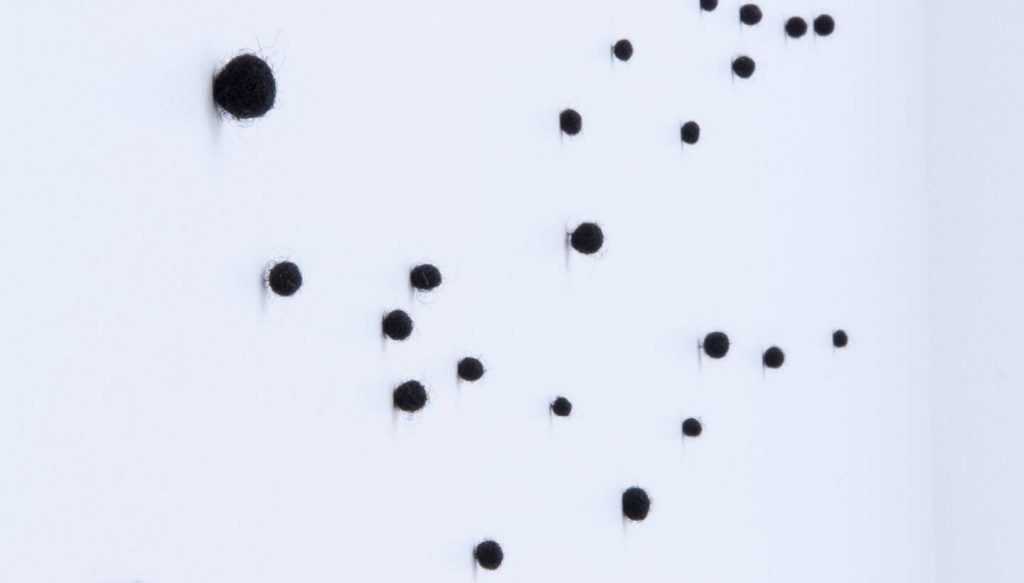
Sonya Clark’s Heavenly Bound, currently on view at the deCordova Museum and Sculpture Park, explores the Underground Railroad and its connection to those seeking freedom throughout history and today. The piece includes a series of large-scale photographs of abolitionists, a night sky made up of the artist’s hair, a parachute installation and a book of cyanotype constellations, which all reference the treacherous journey that self-emancipated Black Americans experienced during their escape.
Personal and Political: Women Photographers, 1965–1985
May 1 – November 28, 2021

Adriana Lestido, Mother and Daughter from Mothers of Plaza de Mayo, 1982. Courtesy Museum of Fine Arts, Boston
Personal and Political: Women Photographers, 1965–1985 includes the work of many well-known American photographers including Diane Arbus and Nan Goldin alongside recently acquired works by lesser-known artists working internationally such as Adriana Lestido and Paz Errázuriz. The exhibit focuses on a specific time in photographic history when women were becoming professional photographers at a higher rate than ever before.
Sharon Harper: Returning Light
April 9 – June 25, 2021
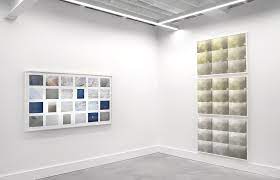
Installation view
Sharon Harper’s Returning Light, currently on view at Rivalry Projects, includes several series of photographs that investigate the cycles of light, providing a more macro view of time and space. Through the imprint of light Harper’s work instills a sense of awe and points toward the changing climate and landscape of our world.
Ground/work
Aug 1, 2020 – Oct 1, 2021
Ground/work includes the installation work of Kelly Akashi, Nairy Baghramian, Jennie C. Jones, Eva LeWitt, Analia Saban, and Haegue Yang. Each of the site-specific pieces considers the relationship between sculpture and nature as well as notions of time, scale and transformation.
Judy Chicago Art Education award
Deadline: June 1, 2021
The Judy Chicago Art Education Award is open to scholars, artists, and educators whose projects engage with the Judy Chicago Research Portal. The award includes a $2,500 prize along with a certificate to be presented in July 2021 in Belen, New Mexico.
Allison Katz: Artery
May 22 – October 31, 2021
Allison Katz’s exhibition, Artery includes paintings, ceramics and posters created in the past 18-months during a time of ongoing national lockdowns. The title of the exhibit speaks to the artist’s interest in networks and systems of connection as well as the spaces in between what is shared and private. Katz’s work will be on display at Nottingham Contemporary through October 2021 and will then be revisualized for the Camden Art Centre in January 2022.
On Hannah Arendt: What is Authority?
April 26 – June 6, 2021
What is Authority? exhibits work from Lili Dujourie, Everlyn Nicodemus, Lerato Shadi and sound artist Laima Leyton. The exhibit is part of a year-long series of shows inspired by Hannah Arendt’s writings about power structures.
Girl You Want
May 1 – August 1, 2021

Genevieve Gaignard, Black is Beautiful, 2016. Installation view in ArtYard’s gallery, 2021. Courtesy of the artist and Vielmetter, Los Angeles, photo by Paul Warchol
Girl You Want, curated by J. Vanessa Lyon, includes the work of Genevieve Gaignard, Julia Greenburger, Jen Liu, Josh Rabineau, Wendy and Beatrice Red Star, Karinne Smith, Ivy Stewart, and María Vargas Aguilar. The exhibit is a broad exploration of what it means to be a girl and traverses the space between girlhood and adulthood.
Promise, Witness, Remembrance
April 7 – June 6, 2021
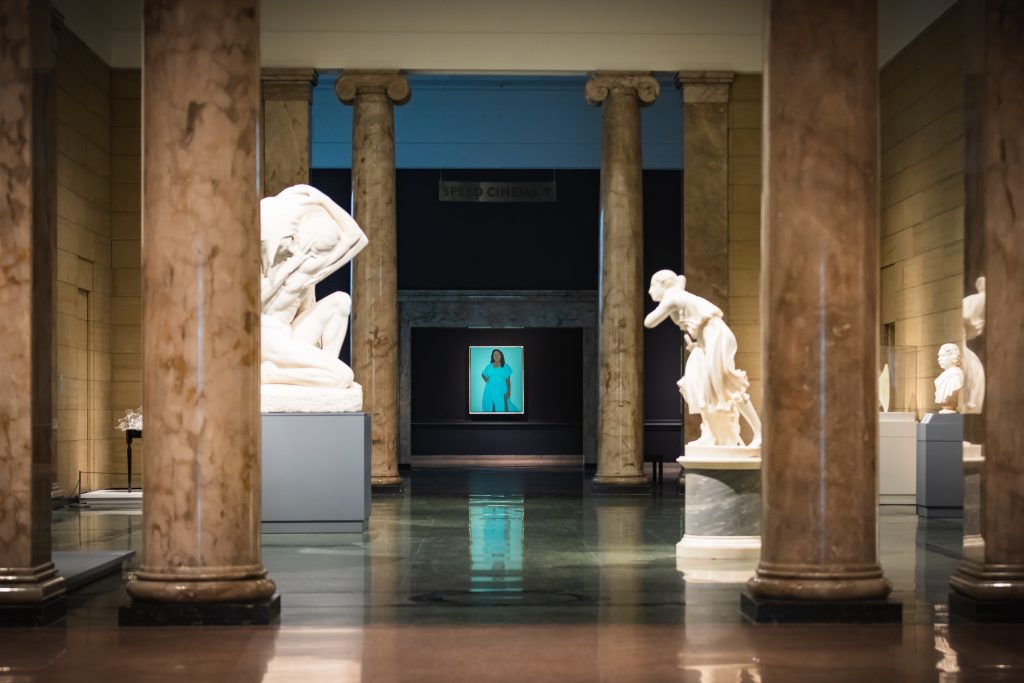
Installation view, Promise, Witness, Remembrance, Speed Art Museum, Louisville, Kentucky. Photo by Xavier Burrell
Promise, Witness, Remembrance was created under the direction of Breonna Taylor’s family along with a committee of artists, mental health professionals and community members. The exhibit pays tribute to Taylor’s life, reflecting on her killing in 2020 and the subsequent protests that took place both locally in Louisville and globally. The artists in this exhibit explore the disconnect between what the American dream has promised and the reality for many of its citizens.
Artist Residency
Deadline: October 1, 2021
Turkey Land Cove Foundation (TLC) offers a residency opportunity in Martha’s Vineyard for women who are in any stage of a project from development to completion. TLC specifically supports applicants who could not otherwise personally finance a residency. Room and board along with travel expenses are provided.
Call for Submissions
Deadline: July 15, 2021
For the 20th annual issue, Mom Egg Review is requesting submissions that respond to the idea of “Mother Figures.” Artwork and Literary pieces including poetry, nonfiction, short fiction, and hybrid works should be submitted by July 15, 2021 for consideration. You do not need to be a mother to participate.
Event: In Conversation with Dr. Nancy Odegaard
posted May 18, 2021
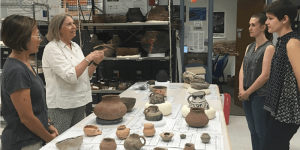
Dr. Nancy Odegaard discusses a strategy of pottery condition reporting with interns as a type of triage, or assignment of conservation treatments based on the types of damage or documentation need when a large volume of vessels are involved. The annual activity known as the Pottery Blitz has been a regular summer activity for many years at the Arizona State Museum.
Watch the recording of our virtual celebration of Dr. Nancy Odegaard, this year’s recipient of the CAA/American Institute for Conservation (AIC) Award for Distinction in Scholarship and Conservation.
Dr. Odegaard’s scholarship and gracious leadership have been central to modeling collaboration between disciplines, advancing conservation discourse, and fostering a more inclusive and nuanced understanding of art and cultural heritage. She has authored several publications that have become standards in the field for conservators, academics in the arts, and students.
The CAA/AIC Award for Distinction in Scholarship and Conservation annually recognizes outstanding contributions by one or more persons who, individually or jointly, have enhanced understanding of art through the application of knowledge and experience in conservation, art history, and art.
This event was produced in partnership with CAA’s affiliate organization, the American Institute for Conservation (AIC) in tandem with their 2021 AIC/SPNHC Joint Virtual Annual Meeting.
CWA Picks: April 2021
posted Apr 27, 2021
Committee on Women in the Arts celebrate a selection of events, exhibitions and calls for work and participation featuring feminist and womxn artists, and address issues about social justice and ethics from intersectional and transnational perspectives. To acknowledge that Covid-19 continues but also to begin envisioning the re-opening of public spaces, we have decided to feature both on-line and in-person events.
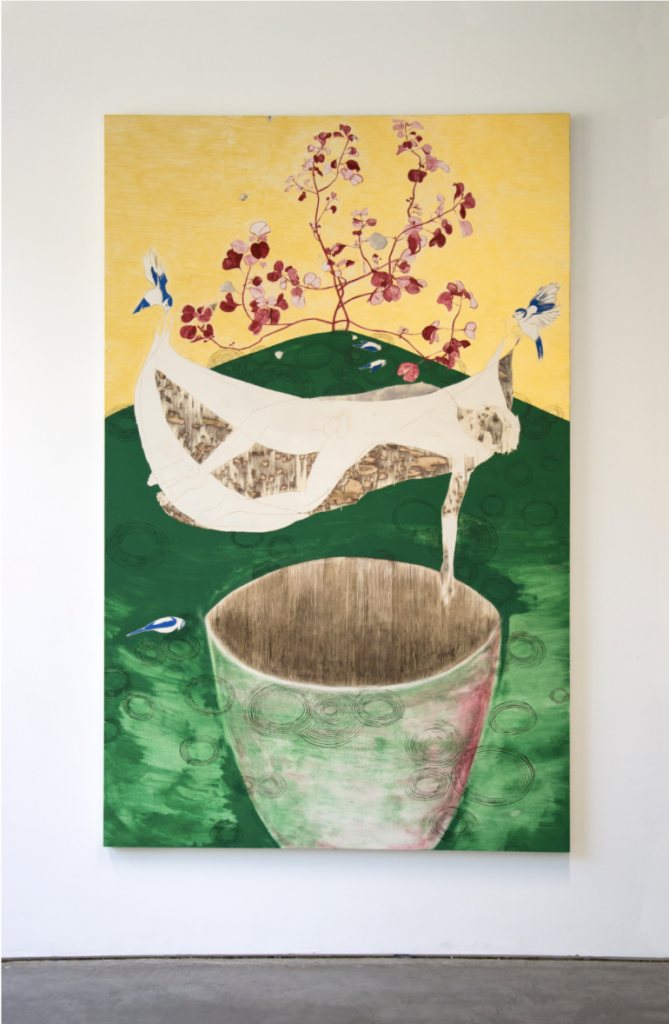
Gaia Fugazza, Blue Tits, 2020, Mineral pigment, beeswax, oil paint, watercolor on carved wood, 180 x 115 cm
Love Letters
April 10 to July 2, 2021
On-line
http://almanacprojects.com/public-programme/love-letters
An epistolary project developed by Basia Sliwinska and Astrid Korporall, Love Letters is a virtual platform that responds to the rise of gender-based violence around the globe and fosters feminist love across the national and cultural boundaries Covid-19 has made more severe. The October 2020 ruling by Poland’s Constitutional Tribunal that abortions in the case of fetal defects are unconstitutional is its animating occasion. Love Letters features the work of six artists–Gaia Fugazza, Małgorzata Markiewicz, Amanda Millis, Joanna Rajkowska, Viktoriia Tofan, and Katarzyna Zimna—who have created work to reflect on the fraught political landscape that gave rise to such a ruling. Proceeds from the sale of the artwork will benefit the All-Poland Women’s Strike (Ogólnopolski Strajk Kobiet: OSK). Composed by Sliwinska and Korporall, the letters that accompany the artwork featured in the on-line exhibition space attend lovingly to how they address the necessity of feminist solidarity in a broken, precarious world.
Lorraine O’Grady: Both/And
March 5 to July 18, 2021
Brooklyn Museum of Art, Elizabeth A. Sackler Center for Feminist Art
https://www.brooklynmuseum.org/exhibitions/lorraine_ogrady
Long overdue and much-anticipated, Both/and is Lorraine O’Grady’s first retrospective. Featuring four decades of artwork that spans performance art, conceptualism, and institutional critique, this exhibition highlights the feminist and decolonial commitments of O’Grady’s oeuvre, which is materially idiosyncratic but thematically consistent. Both/and foregrounds O’Grady’s challenge to fixed positions while also tracking how she has kept western modernity’s reliance upon and erasure of Blackness squarely in view.
Born in Flames: Feminist Futures
April 28 to September 12, 2021
The Bronx Museum of the Arts
http://www.bronxmuseum.org/exhibitions/born-in-flames-feminist-futures
This inter-generational group exhibition speculates on a damaged past for the possibilities of a joy-filled future. Taking its title from Lizzie Borden’s 1983 science fiction film that explored the unjust remainders of a socialist revolution, the spirited, phantasmatic, and highly physical artwork featured in Born in Flames seeks to imagine worlds beyond the entrenched logic of capitalist exploitation. Together the artwork declares that the figurations of women, and the oppressions they have carried in historical time, must be central to such hopeful gestures if they are going to take hold in future realities.
Memorializing the Natural Environment: Maya Lin in conversation
Thursday, May 6, 2021, 6–7 p.m.
Virtual Conversation
https://www.colby.edu/lunderinstitute/memorializing-the-natural-environment/
Artist and designer Maya Lin will be in conversation with Colby University faculty about the process of remembering all that environmental degradation is taking from the planet and how to utilize that archive to forestall further disasters. She will reflect on What is Missing? her multimedia project devoted to the global biodiversity crisis related to the disappearance of habitats. What is Missing? underscores Lin’s talent for yoking the microscopic together with the monumental and sculpting the landscape with heavy but delicate inscriptions of loss.
Senga Nengudi: Topologies
May 2-July 25, 2021
Philadelphia Museum of Art
https://philamuseum.org/calendar/exhibition/senga-nengudi-topologies
Chronicling the entirety of her oeuvre, Topologies offers an in-depth look into Nengundi’s artwork and its precise deployment of the opaque, distorted, and porous. Featuring her sculptures, environmental installations, and performances, and going back to her career’s beginnings in the 1970s, Topologies shows the various and inter-related ways this key figure of the Black American avant-garde suspended the body in ceremonial planes composed of fragile and tough materials as it awaits a more just ground.
Family Tree Whakapapa: Elin, Madeleine, Sarah and Susanne Slavick
April 21 to June 13, 2021
Long Gallery, The Pah Homestead, TSB Wallace Arts Centre
Auckland, New Zealand
https://www.wallaceartstrust.org.nz/exhibitions/whakapapa
This exhibition brings together the artwork of four sisters living in different parts of the globe and focuses on the related and but distinct ways they engage with the arboreal imagination. Tangled into their photographs, paintings, life histories, and political commitments, the trees in their artwork are intricate lines, bold shapes, diffuse traces, and stylized patterns. Defying the ease with which the genealogical and botanical connect in the figure of the family tree, the Slavick sisters make it a thing of wonder: rooted in the ground and multiplying in our imaginations, family trees are botany and biology written with longing, hope, history, and loss.
Lygia Pape: Tupinambá
April 24 to August 1, 2021
Hauser and Wirth, Los Angeles
https://www.hauserwirth.com/hauser-wirth-exhibitions/31619-lygia-pape-tupinamba
This exhibition, Lygia Pape’s first solo show in Los Angeles, features her Tupinambá series, one of the final bodies of work created by this founding member of Brazil’s Neo-Concrete movement. Pape’s use of bright red artificial feathers is a central feature of Tupinambá. Sensuous and regal, they cover chairs, boxes, and balls and point to Pape’s sustained interest in the Indigenous people of Brazil. With her understated surrealism, Pape makes the objects look like dense fragments of far-away rituals. The Memória Tupinambá, a series of three balls covered with red feathers and punctuated with plastic body parts, suggests their sexualized violence: one holds out a hand streaked with blood, one shows a bloody foot, and the third displays two plastic breasts.
Oh, I’m definitely a dessert person
April 24 to May 28, 2021
WHATIFTHEWORLD
Western Cape, South Africa
http://www.whatiftheworld.com/presentation/oh-im-definitely-a-dessert-person/
The I-phone plays multiple roles in Talia Ramkilawan’s charming pictures, which she makes by “rug hooking” bright pastel fabrics, wools, and hessian. It is clear from the accidental fragments, titillating hints of sex, selfie shots, and everyday domestic scenes (birthday parties) and objects (a cake, vases of flowers, a dildo), that Ramkilawan draws from her camera roll, but she also places I-phones in the images themselves. Complete with heart emojis, the phones transmit the unabashedly sweet touch of these images, their “hand-held” feel and hot-pink youth. Ramikilawan’s titles, talky poem-“texts” of one or two lines, crystallize the Black femme wit of her crafty depictions.
Announcing the 2021 Terra Publication Grant Winners
posted Apr 26, 2021
CAA is pleased to announce the 2021 recipients of the Terra Foundation for American Art International Publication Grant.

This program, which provides financial support for the publication of book-length scholarly manuscripts in the history of American art, is made possible by a generous grant from the Terra Foundation for American Art.
The nine Terra Foundation grantees for 2021 are:
Julie Ault, ed., Hidden in Plain Sight: Selected Writings on Asian American Art by Karen Higa, Dancing Foxes Press
Melissa Dabakis and Paul Kaplan, eds., Republics and Empires: Italian and American Art in Transnational Perspective, 1840-1970, Manchester University Press
Alice Dusapin, Wolfgang Stoerchle: Success in Failure, octopus/Christophe Daviet-Thery
Richard Hertz, Jack Goldstein and the CalArts Mafia, Les presses du réel, translation from English to French
Amy Von Lintel and Bonnie Roos, Expanding Abstract Expressionism: Women Artists and the Middle American West, Texas A&M University Press
Margaretta Markle Lovell, Painting the Inhabited Landscape: Fitz H. Lane and The Global Reach of Antebellum New England, The Pennsylvania State University Press
Friederike Schaefer, Claiming Space(s). Locating Suzanne Harris’ Dance Practice and Ephemeral Installations within New York City in the 1970s, De Gruyter
The International Author Conference Subventions confer two non-US authors of top-ranked books travel funds and complimentary registration to attend CAA’s 2022 Annual Conference in Chicago, February 16-19; they also received one-year CAA memberships.
The two author awardees for 2021 are:
- Alice Dusapin
- Friederike Schaefer
Meet the 2020 Professional Development Fellows
posted Apr 19, 2021
CAA is pleased to announce the recipient of the 2020 Professional Development Fellowships. The recipient of the $10,000 fellowship in visual art is Ana Maria Farina, SUNY New Paltz. A fellowship in art history was not awarded this year.
The honorable mention in visual art is awarded to Sabrina Pastard, Columbia College Chicago. All fellows and honorable mentions receive a complimentary one-year CAA membership and registration for the 2022 Annual Conference in Chicago.
2020 PROFESSIONAL DEVELOPMENT FELLOWSHIP IN VISUAL ARTS
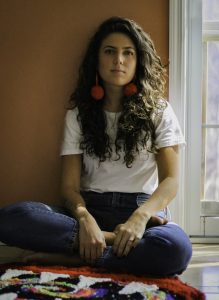
Ana Maria Farina, SUNY New Paltz
Ana Maria Farina paints using a gun––a tufting gun––along with needles, hooks, and knots. Repurposing a phallic signifier of violence, she conjures vibrant objects of comfort that inhabit a mystical pictorial space between abstraction and representation.
Ana Maria was born and raised in Brazil and is now based in the Hudson Valley, New York. She received her masters degree in Art and Art Education from Columbia University in 2016, and in 2018 she was awarded a fellowship to the New York Foundation for the Arts Immigrant Artist Mentoring Program. In 2019, she received a scholarship to attend the MFA program at SUNY New Paltz, where she also served as the Visiting Artist Director and Instructor of Record. Ana’s work has been featured in many spaces throughout New York and she has upcoming exhibitions at the Wassaic Project, the Garrison Art Center, the Dorsky Museum, among others.
HONORABLE MENTION IN VISUAL ART
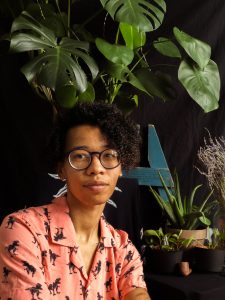
Sabrina Pastard, Columbia College Chicago
Sabrina Pastard is a visual artist who works with the poetics in the meta of the mundane. Often balancing her visuals on the borderline of familiarity and the abject, safety and crisis. Her multidisciplinary practice ranges in medium from ready-made sculptures and abstract prints to conceptual writings and poetry. Each new work invites an intellectual intimacy from the viewer as it inquires to the status of our assumed lives and societal taboos. Pastard was raised in St. Louis, MO and received her B.A. in studio art from George Fox University. She currently resides in Chicago and will complete her MFA at Columbia College Chicago in May 2021.
ABOUT THE PROFESSIONAL DEVELOPMENT FELLOWSHIP
CAA’s Professional Development Fellowship program supports promising artists and art historians who are enrolled in MFA and PhD programs nationwide. Awards are intended to help them with various aspects of their work, whether for job-search expenses or purchasing materials for the studio. CAA believes a grant of this kind, without contingencies, can best facilitate the transition between graduate studies and professional careers. The program is open to all eligible graduate students in the visual arts and art history. Applications for the 2021 fellowship cycle will be due December 15, 2021. Learn more.
CAA at 2021 Advocacy Days
posted Apr 16, 2021
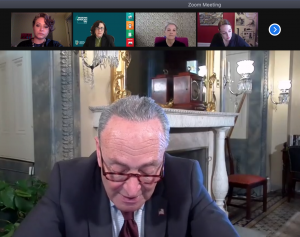
Screenshot of CAA in virtual conversation with NY Senator Chuck Schumer, 2021
CAA representatives advocated for the arts and humanities with partners at the American Association of Museums (AAM) and the National Humanities Alliance (NHA) this spring for Museums Advocacy Day on February 23 and Humanities Advocacy Day on March 11, 2021. Alongside other academic societies, scholars, and museum professionals, CAA urged congressional representatives and senators to back full funding for the National Endowment for the Arts (NEA), the National Endowment for the Humanities (NEH) and particularly the Institute for Museum and Library Services (IMLS), which provides grants for museums and arts organizations throughout the country, for the fiscal year 2022. Increased allocations for these programs would bring funding levels back to what they were over a decade ago in 1998. We met with the offices of New York representatives Tom Reed, Jerry Nadler, Carolyn Maloney, John Katko, and Yvette Clarke and senators Kirsten Gillibrand and Chuck Schumer. Sen. Schumer joined Museums Advocacy Day in person to share his enthusiasm about moving forward with emergency relief funds for arts organizations and supporting more space for them in the next year’s congressional budget.
CAA has been participating in these meetings for the past three years. We noted that 1/3 of all museums in the US are at risk of closing without assistance. We also stressed the importance of museums as institutions that have served our community greatly during COVID and have come up with creative solutions for childhood education, community building, virtual exhibitions, and out-of-the-box engagement strategies. The arts and humanities have helped our communities cope and their spaces—schools, libraries, and museums—remain some of the only spaces in communities that can be accessed freely by the public.
Jay Buchanan, Holly Gabelmann, Caroline Giddis, and Clarissa Chevalier: “Collaboration, finding purpose, occupying intermediate space and making noise together!”
posted Apr 09, 2021
Jay Buchanan is a theorist, poet, and arts orchestrator.
Holly Gabelmann is an artist, writer, and asker of questions. They are the co-creators of Idiosynchrony, a podcast and collective sonic artwork. www.idiosynchronypodcast.com
Caroline Giddis is a writer, emerging curator, and art historian of the long nineteenth century focusing on intersectional feminism.
Clarissa Chevalier is an interdisciplinary researcher, writer, and art historian specializing in modern and contemporary ecological art.They are the founders and co-editors of Tesserae Press, an online arts publication for emerging creative voices. www.TesseraePress.com
Sean Nash and Stephanie Maroney: Microbial Teachers and Fermentive Pedagogies
posted Apr 04, 2021
Join us for a conversation with Sean Nash, a visual artist and food fermentation experimentalist, and Stephanie Maroney, a feminist science and food studies scholar, as they discuss “Microbial Teachers and Fermentive Pedagogies.”
Sean Nash is a visual artist and food fermentation experimentalist. His multidisciplinary work integrates fermented foods with sculptures as edible, time-based, and socially engaged components of programs and exhibitions. Sean’s work has been shown nationally, with solo shows at the Kniznick Gallery at Brandeis (Krautsourcing, 2019), Plug Projects in Kansas City, MO (Lactobacillus Amongus, 2017), and Black Ball Projects in Brooklyn, NY (They/Them/Their, 2016). His work can be found at senash.com
Stephanie Maroney is a feminist science and food studies scholar creating collaborative projects on fermentation and mycology. She has published on the topics of queer fermentation praxis, the colonial afterlife of microbiome science, and probiotic dietary culture. Stephanie has a Ph.D in Cultural Studies and administers a community-engaged arts and humanities research program at UC Davis.
Stephanie Schwartz and Jorge Ribalta–Walker Evans: No Politics
posted Mar 29, 2021
In this conversation, the pair discuss Schwartz’s new book Walker Evans: No Politics. The first book to take seriously Evans’s refusal to act or work politically, Walker Evans offers a sweeping reassessment of American documentary and its histories. Opening with a discussion of Evans’s place in the canon as well as Schwartz’s efforts to problematise canonical histories of documentary, the podcast covers a range of topics, from the publication of Evans’s short, but punchy, review of photographic books, his 1931 essay “The Reappearance of Photography,” to the 1971 retrospective exhibition of his work at the Museum of Modern Art. At the centre of this conversation is a debate about Evans’s legacy, about how and why it needs to be reimagined today.
Stephanie Schwartz is an Associate Professor of the History of Art at University College, London.
Jorge Ribalta is an independent curator and photographer living and working in Barcelona.
CAA signs on to ACLS Statement in solidarity with Asian Americans and Pacific Islanders
posted Mar 29, 2021
CAA joins 36 member societies in solidarity with Asian Americans and Pacific Islanders in signing a statement by the American Council of Learned Societies (ACLS) condemning the appalling acts of racism, violence, and discrimination committed against these communities.
That statement asserts, “We find ourselves in a moment where, for good reason, we and many other Americans have been and continue to be focused intently on anti-Black racism. But we are reminded by the horrific events in Georgia this week and increased acts of violence over this past year linked to the COVID-19 pandemic, of the deep prejudices affecting Asians in this country. These and other attacks against the Asian-American community represent the latest chapter in our history of xenophobia, which tends to flare during times of crisis.” (ACLS American Council of Learned Societies)


